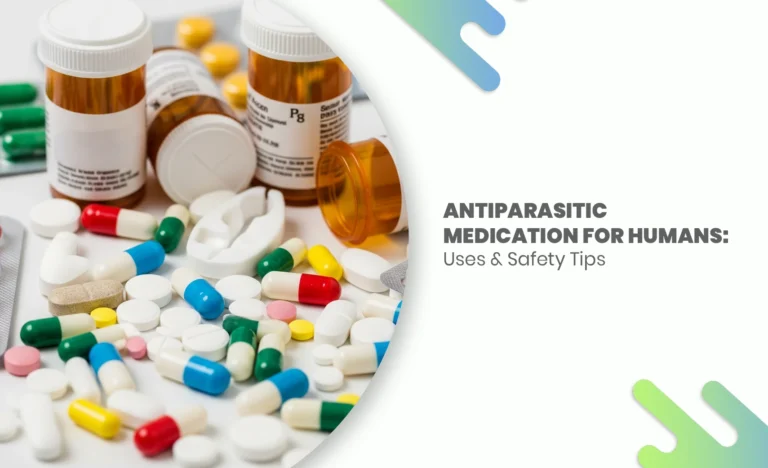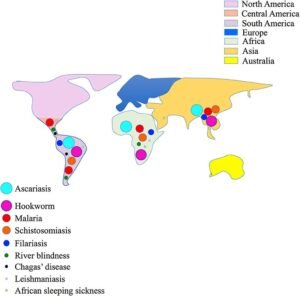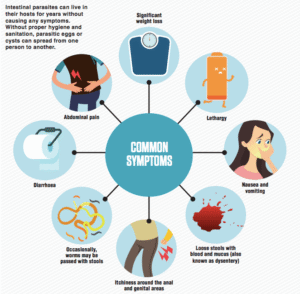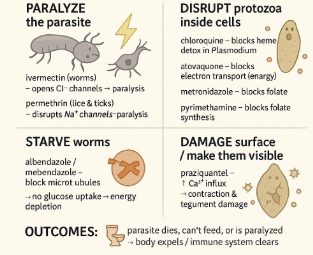Antiparasitic Medication for Humans: Uses & Safety Tips

What are antiparasitic medications?
Antiparasitic drugs are medicines designed to fight human parasitic infections such as intestinal worms, protozoal diseases, or infestations like scabies and head lice. These medications, sometimes referred to as parasitic disease medication or antiparasitic therapy, work by targeting parasites without causing major harm to the human body.
Why parasites in humans are a serious global health issue.

Parasitic infections remain a widespread concern in both developed and developing regions. Conditions like malaria, giardiasis, roundworm infection, and tapeworm infestations affect millions each year. Beyond tropical medicine, parasites also show up in everyday settings, in the form of pinworm infections in children, scabies outbreaks, and even toxoplasmosis therapy during pregnancy highlight their impact. Left untreated, these infections can cause chronic illness, malnutrition, and complications requiring urgent antiparasitic treatment.
While each medication works differently, most antiparasitic drugs act by either paralyzing the parasite, interfering with its ability to absorb nutrients, or directly destroying it. For example, albendazole and mebendazole starve intestinal worms, while metronidazole clears protozoal infections like amebiasis and giardiasis. Some, like ivermectin (Iversun 12Mg) or permethrin, are used for external parasites such as lice or scabies. Others, like chloroquine or artemisinin, are life-saving in malaria treatment.
Together, these therapies form the backbone of infectious disease treatment and remain essential in controlling both gastrointestinal parasites and vector-borne diseases worldwide.
What Are Parasites and How Do They Affect Humans?

Types of human parasites
Parasites are organisms that live in or on the human body and rely on us for survival, often causing illness. They generally fall into three groups:
- Protozoa – single-celled organisms responsible for diseases like giardiasis and amoebiasis treatment cases.
- Helminths (worms) – larger organisms such as roundworms, tapeworms, and pinworms that infect the digestive tract and require antiparasitic drugs for removal.
- Ectoparasites – external parasites like head lice and scabies, which require topical or oral antiparasitic treatment such as permethrin or ivermectin (Iversun 12Mg).
Common infections in the U.S. vs. worldwide
In the United States, the most frequently reported human parasitic infections include pinworm in children, giardiasis for contaminated water exposure, and scabies in group living facilities.
Globally, the burden is heavier in regions where tropical medicine is a daily necessity. Malaria treatment remains critical in Africa and parts of Asia, while toxoplasmosis therapy is especially important for pregnant women worldwide. Poor sanitation, unsafe drinking water, and limited access to healthcare make intestinal worms and other gastrointestinal parasites a persistent threat in developing countries.
Symptoms of parasitic infections people often overlook

Parasitic diseases don’t always present with dramatic signs. Some subtle but telling symptoms include:
- Persistent fatigue and weakness (often linked to anemia from worm infection).
- Unexplained digestive issues like bloating, diarrhea, or constipation.
- Itchy skin or rashes from ectoparasitic infestations like lice or scabies.
- Neurological symptoms in rare cases, such as those seen with advanced toxoplasmosis or tapeworm infection.
Because these signs can mimic other conditions, many people delay antiparasitic therapy, allowing parasites to thrive and increasing the risk of complications.
Types of Antiparasitic Medications
Antiparasitic medications are grouped into different classes based on the type of infection they target. Understanding these categories helps doctors choose the right parasitic disease medication for each condition.
1. Antiprotozoals
These drugs target protozoal infections such as giardiasis, amebiasis, and trichomoniasis.
- Metronidazole – commonly used for giardiasis medication and amebiasis treatment.
- Nitazoxanide – effective against cryptosporidiosis and some viral gastroenteritis cases.
- Tinidazole – an alternative for resistant protozoal infections.
These drugs typically work by disrupting the DNA of protozoa, preventing them from multiplying.
2. Antihelminthics (Deworming Agents)
Antihelminthic drugs are used against intestinal worms and other helminth infections.
- Albendazole – broad-spectrum; treats roundworm infection, pinworm treatment, and tapeworm removal.
- Mebendazole – similar uses, often preferred in pediatric dosing.
- Ivermectin (Iversun 12Mg) – treats strongyloidiasis and external conditions like scabies treatment.
- Pyrantel pamoate – an over-the-counter antiparasitic medication for common worm infections.
- Praziquantel – specifically used for schistosomiasis and liver flukes.
These drugs usually work by either starving the worm of nutrients or paralyzing it so the body can expel it naturally.
3. Antimalarials
This group is critical in tropical medicine where malaria treatment saves millions of lives each year.
- Chloroquine – historically first-line, though resistance has limited its use.
- Artemisinin-based therapies – currently the gold standard for resistant malaria strains.
- Prophylactic treatment options are available for travelers heading to high-risk areas.
These medications often target the parasite within red blood cells, interrupting its life cycle.
4. Ectoparasiticides
Designed for external parasites like lice and mites.
- Permethrin – first-line head lice medication and topical cream for scabies treatment.
- Oral ivermectin – used in resistant cases or widespread infestations.
These drugs act by paralyzing or killing the parasites living on the skin and hair.
Comparison of Drug Classes
Class | Examples | Common Uses |
Antiprotozoals | Metronidazole, Nitazoxanide | Giardiasis, amebiasis, trichomoniasis |
Antihelminthics | Albendazole, Mebendazole, Ivermectin, Pyrantel pamoate, Praziquantel | Roundworm, tapeworm, pinworm, strongyloidiasis, schistosomiasis |
Antimalarials | Chloroquine, Artemisinin | Malaria treatment, prophylaxis |
Ectoparasiticides | Permethrin, Ivermectin | Scabies, head lice medication |
Commonly Prescribed Antiparasitic Drugs & Their Uses
Doctors rely on a handful of trusted antiparasitic medications that have proven effective against different infections. Each drug targets a specific group of parasites, and knowing which one is used for which condition makes it easier to understand treatment options.
Albendazole & Mebendazole – Worm Infections
Both drugs are frontline treatments for intestinal worm infections such as roundworm, pinworm, and hookworm.
- Albendazole: Broad-spectrum, also used for tapeworm infection and hydatid disease.
- Mebendazole: Similar spectrum, often chosen for pediatric parasitic infections.
They work by preventing parasites from absorbing glucose, effectively starving them.
Ivermectin – Scabies & Strongyloidiasis
A highly versatile drug, Ivermectin (Iversun 12Mg) is effective against both internal and external parasites.
- Scabies treatment when topical creams fail.
- Strongyloidiasis (a dangerous threadworm infection).
- Onchocerciasis (river blindness) in endemic regions.
It paralyzes the parasite’s nervous system, allowing the body to flush it out.
Metronidazole & Tinidazole – Protozoal Infections
These are the go-to antiprotozoal medications for several infections:
- Metronidazole: Used for giardiasis treatment, trichomonas infection, and amebiasis.
- Tinidazole: Similar to metronidazole but often prescribed when fewer doses are preferred.
They kill protozoa by damaging their DNA, preventing them from multiplying.
Chloroquine & Artemisinin-based Drugs – Malaria
Malaria treatment is one of the biggest victories of antiparasitic therapy.
- Chloroquine: Still used in areas without resistant strains.
- Artemisinin-based combination therapies (ACTs): Gold standard for resistant malaria cases.
These drugs destroy the malaria parasite inside red blood cells, breaking its life cycle.
Permethrin – Lice & Scabies
A topical antiparasitic that remains first-line for head lice treatment and scabies infestations.
- Applied as a cream or lotion directly on the skin.
- Works by paralyzing lice and mites.
It’s safe, effective, and widely available as an over-the-counter medication in many countries.
Drug vs. Parasite Table
Drug | Target Parasite / Infection | Common Use |
Albendazole | Roundworm, Pinworm, Hookworm, Tapeworm | Broad-spectrum worm treatment |
Mebendazole | Roundworm, Pinworm, Whipworm | Intestinal worm infections (children & adults) |
Ivermectin (Iversun 12Mg) | Strongyloidiasis, Scabies, River Blindness | Internal & external parasitic infection |
Metronidazole | Giardia, Trichomonas, Amebiasis | Protozoal infections |
Tinidazole | Giardia, Trichomonas | Alternative protozoal treatment |
Chloroquine | Plasmodium (malaria parasite) | Malaria treatment (non-resistant areas) |
Artemisinin-based drugs | Resistant malaria strains | ACT therapy (gold standard) |
Permethrin | Lice, Scabies | Topical ectoparasite medication |
How Antiparasitic Medications Work

Most people are surprised to learn that antiparasitic drugs don’t all work the same way. Because parasites are so diverse, ranging from tiny single-celled protozoa to large intestinal worms and even external mites, different medications use different tricks to stop them.
Starving the Parasite
Some antihelminthic drugs like albendazole and mebendazole prevent worms from absorbing glucose, their main energy source. Without food, the worm weakens and dies, and the body naturally flushes it out. Think of it like cutting off the electricity to a house, it can’t function for long.
Paralyzing Worms & Mites
Medications such as ivermectin (Iversun 12Mg) and pyrantel pamoate interfere with the parasite’s nervous system. This leaves the worm or mite unable to move or hold onto the intestines or skin, making it easy for the body to remove them. This is especially useful in roundworm infection and scabies treatment.
Damaging Parasite DNA
Antiprotozoal drugs like metronidazole and tinidazole work by breaking down the parasite’s DNA. Without the ability to reproduce, protozoa such as Giardia or Trichomonas are quickly cleared.
Targeting Malaria Parasites
Antimalarials like chloroquine and artemisinin attack the malaria parasite while it hides inside human red blood cells. They disrupt the parasite’s growth cycle so it can’t multiply and spread.
Why Resistance Can Develop
Just like bacteria can become resistant to antibiotics, parasites can adapt to antiparasitic therapy.
- Overuse or misuse of drugs (taking them without proper dosage guidelines).
- Parasites mutating over generations.
- Incomplete treatment courses leading to survival of stronger strains.
This is why doctors emphasize medication compliance, finishing the full treatment duration, and sometimes using combination therapy, to lower the risk of resistance.
Dosage and Administration
Unlike common painkillers, antiparasitic medications don’t follow a “one size fits all” approach. The dosage guidelines are highly specific, depending on the type of parasite, the patient’s age, body weight, and overall health condition.
General Principles
- Doctor-prescribed only: Whether it’s albendazole for intestinal worms, chloroquine for malaria treatment, or ivermectin for scabies, the right dose must be tailored to the infection and the patient.
- Weight and age-dependent: Children often require different dosing than adults. For example, pediatric dosing of mebendazole is lower and adjusted carefully for safety.
- Treatment duration matters: Some medications (like a single dose of albendazole for pinworm treatment) work quickly, while others (like metronidazole for giardiasis medication) may need several days of therapy.
Why Self-Medication Is Risky
It can be tempting to try over-the-counter antiparasitic medications or leftover pills, but this carries real risks:
- Incorrect dosage may not fully clear the infection, leading to drug resistance.
- Unsupervised use can cause harmful side effects or dangerous drug interactions with other medicines.
- Some parasites mimic common stomach or skin issues; without proper diagnosis, treatment may be misdirected.
Special Considerations
Certain groups need extra caution with antiparasitic therapy:
- Children: Require pediatric dosing; not all drugs are safe for young ages.
- Pregnant women: Some drugs like albendazole and ivermectin are avoided in early pregnancy; pregnancy safety must be confirmed by a doctor.
- Elderly patients: May metabolize drugs differently and are more prone to adverse reactions.
Safety Tips & Precautions
While antiparasitic drugs are highly effective when prescribed correctly, they aren’t suitable for everyone. Knowing the safety guidelines helps prevent complications and ensures the best results from treatment.
When Not to Take Antiparasitics
- Pregnancy safety: Some medications, like albendazole and ivermectin, are not recommended during the first trimester.
- Pre-existing health issues: Patients with severe liver disease, kidney problems, or blood disorders may be advised against certain drugs.
- Unconfirmed diagnosis: Taking these medications without testing risks masking symptoms or worsening side effects.
Common Drug Interactions
Antiparasitic therapy can interact with other prescriptions:
- Metronidazole may interact with alcohol, causing nausea and flushing.
- Chloroquine can affect heart rhythm if combined with other cardiac medications.
- Albendazole and mebendazole may interact with drugs that affect the liver.
Always inform your doctor about all medications, including over-the-counter and herbal remedies, to avoid drug interactions.
Allergies and Sensitivities
- Skin rashes, itching, or breathing difficulties may signal an allergic reaction.
- Patients sensitive to permethrin (for scabies or head lice treatment) may need alternative options.
- Anyone with a history of drug hypersensitivity should use caution.
Long-Term Use Risks
Prolonged or repeated use of certain parasitic disease medications can stress major organs:
- Liver: Some drugs may elevate liver enzymes.
- Kidneys: Risk of accumulation in patients with reduced kidney function.
- Blood counts: Rarely, long-term therapy can affect white blood cells or bone marrow.
Regular medical monitoring, such as blood tests for liver and kidney function is sometimes necessary if treatment lasts more than a few days or requires multiple courses.
Side Effects to Watch For
Like all medications, antiparasitic drugs can cause side effects. Most are mild and temporary, but some require medical attention. Knowing what to expect helps patients stay safe while completing their antiparasitic treatment.
Common Mild Side Effects
These often resolve as the body adjusts to treatment:
- Nausea or upset stomach
- Diarrhea or abdominal cramps
- Headache or dizziness
- Fatigue or weakness
- Mild skin rash with topical agents like permethrin
Such effects are usually not dangerous but should be mentioned to a doctor if they persist.
Serious but Rare Side Effects
Though uncommon, some adverse reactions need close monitoring:
- Neurological effects: confusion, seizures, or unsteady movements (rare with high-dose ivermectin or mebendazole).
- Allergic reactions: hives, swelling of the face or throat, or difficulty breathing.
- Organ toxicity:
- Liver problems – yellowing of the skin or eyes (jaundice).
- Kidney issues – decreased urine output, swelling in legs.
- Blood abnormalities – unusual bruising or frequent infections from low white blood cell counts.
- Liver problems – yellowing of the skin or eyes (jaundice).
When to Call a Doctor Immediately
Seek urgent care if you experience:
- Severe allergic reaction (trouble breathing, chest tightness).
- Persistent vomiting or diarrhea leading to dehydration.
- Signs of liver or kidney damage (jaundice, dark urine, reduced urination).
- Unusual neurological symptoms like seizures or loss of coordination.
Natural & Supportive Measures Against Parasites
While antiparasitic medications remain the cornerstone of treatment, lifestyle choices and supportive care can help prevent reinfection and improve recovery. These steps are not a replacement for prescribed therapy but can complement it.
Diet & Hygiene Habits That Lower Infection Risk
- Handwashing: The simplest and most effective step for avoiding intestinal worms and giardiasis in the first place.
- Food safety: Cooking meat thoroughly, washing fruits and vegetables, and avoiding untreated water reduces exposure to tapeworm, roundworm, and amebiasis infections.
- Personal hygiene: Keeping nails trimmed and discouraging nail-biting helps prevent pinworm treatment failures.
- Travel precautions: In areas with high rates of tropical infections, bottled water and mosquito precautions are essential.
Gut Health & Probiotics
After clearing an infection, the gut often needs time to recover.
- Probiotics (found in yogurt, kefir, and supplements) may help restore balance after antiparasitic therapy or antibiotic use.
- A healthy gut microbiome strengthens the immune system and may lower susceptibility to gastrointestinal parasites.
Home Remedies: Myths vs. Evidence
Many traditional remedies are passed down through cultures, but not all have strong evidence.
- Garlic, papaya seeds, and pumpkin seeds: Some small studies suggest antiparasitic effects, but results are inconsistent.
- Herbal teas and “cleanses”: Often marketed online, but most lack scientific backing and can cause adverse reactions if overused.
- Natural antiparasitic alternatives: While interesting, these should only be considered supportive, not substitutes for prescribed antiparasitic drugs.
Key takeaway: Home remedies may support gut health or provide symptom relief, but they should never replace medical treatment.
Preventing Parasitic Infections
Prevention is often easier, and safer than treatment. Alongside antiparasitic therapy, adopting smart habits can significantly reduce your risk of human parasitic infections.
Food & Water Safety Tips
- Cook meat thoroughly to prevent tapeworm and other intestinal worms.
- Wash fruits and vegetables with clean water to reduce exposure to giardiasis needs.
- Avoid untreated water when traveling to high risk areas; use bottled or boiled water to prevent amebiasis.
Travel Safety Precautions
- Take prophylactic treatment when visiting malaria endemic regions.
- Use mosquito nets and repellents to prevent vector-borne diseases like malaria.
- Stay informed about local outbreaks of zoonotic infections and follow official guidelines.
Hygiene Practices at Home
- Wash hands regularly, especially after using the bathroom or handling pets.
- Keep fingernails short to prevent pinworm treatment failures.
- Avoid sharing personal items like combs, towels, or bedding to reduce head lice.
Community-Level Prevention
- Vector control programs can drastically reduce the spread of diseases like malaria and filariasis.
- Sanitation improvements, clean water, proper sewage, and waste disposal help lower gastrointestinal parasites in the population.
- Community education campaigns raise awareness about parasitic disease medication and encourage safe practices.
Special Populations: What You Should Know
Certain groups require extra caution when using antiparasitic medications. Understanding these differences ensures both safety and effectiveness.
Pregnant Women
- Some antiparasitic drugs like albendazole, mebendazole, and ivermectin (Iversun 12Mg) are generally not recommended in the first trimester.
- Metronidazole and tinidazole may be prescribed for protozoal infections, but only under careful medical supervision.
- Untreated infections (e.g., toxoplasmosis) can harm both mother and baby, so balancing pregnancy safety with effective antiparasitic therapy is crucial.
Children
- Pediatric dosing differs from adults, often based on weight rather than age alone.
- Drugs like albendazole, mebendazole, and pyrantel pamoate are commonly used but must be carefully measured to avoid adverse reactions.
- Children are more prone to pinworm infections, so completing the treatment duration and practicing hygiene is essential.
Immunocompromised Patients
- Individuals with HIV, organ transplants, or undergoing chemotherapy are at higher risk for severe human parasitic infections.
- Certain drugs may need dose adjustments or alternative therapies due to weakened immunity.
- Monitoring for drug interactions and adverse reactions is especially important in this group.
Cost, Accessibility, and Global Health Impact
Access to antiparasitic medications varies widely across the world, influencing both individual health outcomes and global disease control efforts. Understanding cost, availability, and risks is essential for safe and effective treatment.
Over-the-Counter vs. Prescription-Only
- Some antiparasitic drugs, like pyrantel pamoate and permethrin for lice or scabies treatment, are available over-the-counter in the U.S.
- Others, including albendazole, ivermectin (Iversun 12Mg), metronidazole, and artemisinin-based therapies, are prescription-only due to dosing complexity, potential drug interactions, and adverse reactions.
- Costs can vary depending on insurance coverage, generic vs. brand name, and pharmacy pricing.
Availability in the U.S. vs. Developing Countries
- In the U.S., most human parasitic infections are treatable with widely available medications, though some antimalarials require specialty pharmacies or travel clinics.
- In developing countries, access can be limited due to healthcare infrastructure gaps, cost, and supply shortages, making over-the-counter antiparasitic medications less reliable.
- Programs supported by WHO or NGOs often provide essential antiparasitic therapy in endemic regions, including intestinal worm treatment and malaria prevention.
Why Counterfeit Antiparasitics Are a Global Health Problem
- Fake or substandard drugs may contain insufficient active ingredients, leading to treatment failure and drug resistance.
- Counterfeit medications can cause serious adverse reactions, organ toxicity, or prolong infections.
- Raising awareness about safe sources, proper prescriptions, and antiparasitic therapy compliance is crucial for both individual and public health.
Future of Antiparasitic Treatments
The fight against human parasitic infections is evolving. Researchers and pharmaceutical companies are exploring new strategies to improve antiparasitic therapy, overcome drug resistance, and prevent infections before they start.
Research on Drug Resistance
- Parasites, like bacteria, can adapt to survive repeated antiparasitic treatment.
- Studies are focusing on identifying resistant strains of worms, protozoa, and malaria parasites.
- Understanding resistance mechanisms helps guide dosage guidelines, combination therapies, and new drug design to maintain effectiveness.
New Drug Classes in Development
- Scientists are working on novel antihelminthics and antiprotozoal agents with unique mechanisms of action, such as targeting parasite metabolism or reproduction.
- Some drugs aim to treat multi-drug resistant infections that current antiparasitic medications can no longer address.
- Early clinical trials show promise for safer, shorter-course therapies, which could improve medication compliance and reduce adverse reactions.
Role of Vaccines in Parasite Prevention
- While vaccines for viral and bacterial infections are common, research into parasite vaccines is gaining momentum.
- Malaria vaccines have already been approved in some countries, reducing incidence and severity of Plasmodium infections.
- Future vaccines could target intestinal worms, toxoplasmosis, or other protozoal infections, complementing antiparasitic therapy and prophylactic treatment.
Conclusion & Safety Reminder
Antiparasitic medications are powerful tools in the fight against human parasitic infections. When used correctly, they effectively treat intestinal worms, protozoal infections, malaria, scabies, and lice. However, their safety and effectiveness depend on responsible use and adherence to professional guidance.
Use Medications Responsibly
- Always follow dosage guidelines, complete the full treatment duration, and avoid skipping doses.
- Be aware of potential drug interactions, side effects, and contraindications.
- Understand that misuse or self-medication can lead to drug resistance and serious complications.
Consult a Healthcare Professional
- Medical evaluation ensures the right antiparasitic therapy for your infection type.
- Special populations, children, pregnant women, and immunocompromised patients, require careful supervision.
- Your doctor can monitor adverse reactions, adjust doses, and provide guidance on preventive measures.
Do not self-medicate. Always seek professional guidance for diagnosis, antiparasitic treatment, and preventive strategies. Responsible use of these medications protects both your health and the broader community.
FAQs
1. What is the best antiparasitic medication for humans?
Albendazole and mebendazole are most frequently prescribed for treatment of intestinal nematode infections (ascariasis, hookworm infections, trichuriasis, strongyloidiasis, and enterobiasis) and can also be used for intestinal tapeworm infections (taeniases and hymenolepiasis).
2. Is it safe to take antiparasitic?
While some antiparasitic drugs have shown genotoxic potential in laboratory studies, most are considered safe for human use at therapeutic doses. Long-term or high-dose exposure may carry more risk; moreover, the genotoxic effects of the drugs can interfere with the genotoxicity of the parasitic infection.
3. What are the side effects of parasite medication?
Ivermectin may cause side effects. Tell your doctor if any of these symptoms are severe or do not go away:
- dizziness.
- loss of appetite.
- nausea.
- vomiting.
- stomach pain or bloating.
- diarrhea.
- constipation
4. How do you know if your body is full of parasites?
If you continue to experience symptoms like stomach cramps and pain, nausea or vomiting, dehydration, weight loss, and digestive problems, including unexplained constipation, diarrhea, or persistent gas even after trying several treatments, you may have a parasite.
5. What foods should you avoid after deworming?
The answer is that you can eat at any time after taking deworming medicine. This is because the mechanism of the medicine does not affect eating. In fact, deworming medicine works by inhibiting the glucose absorption of worms, causing them to weaken and die.


